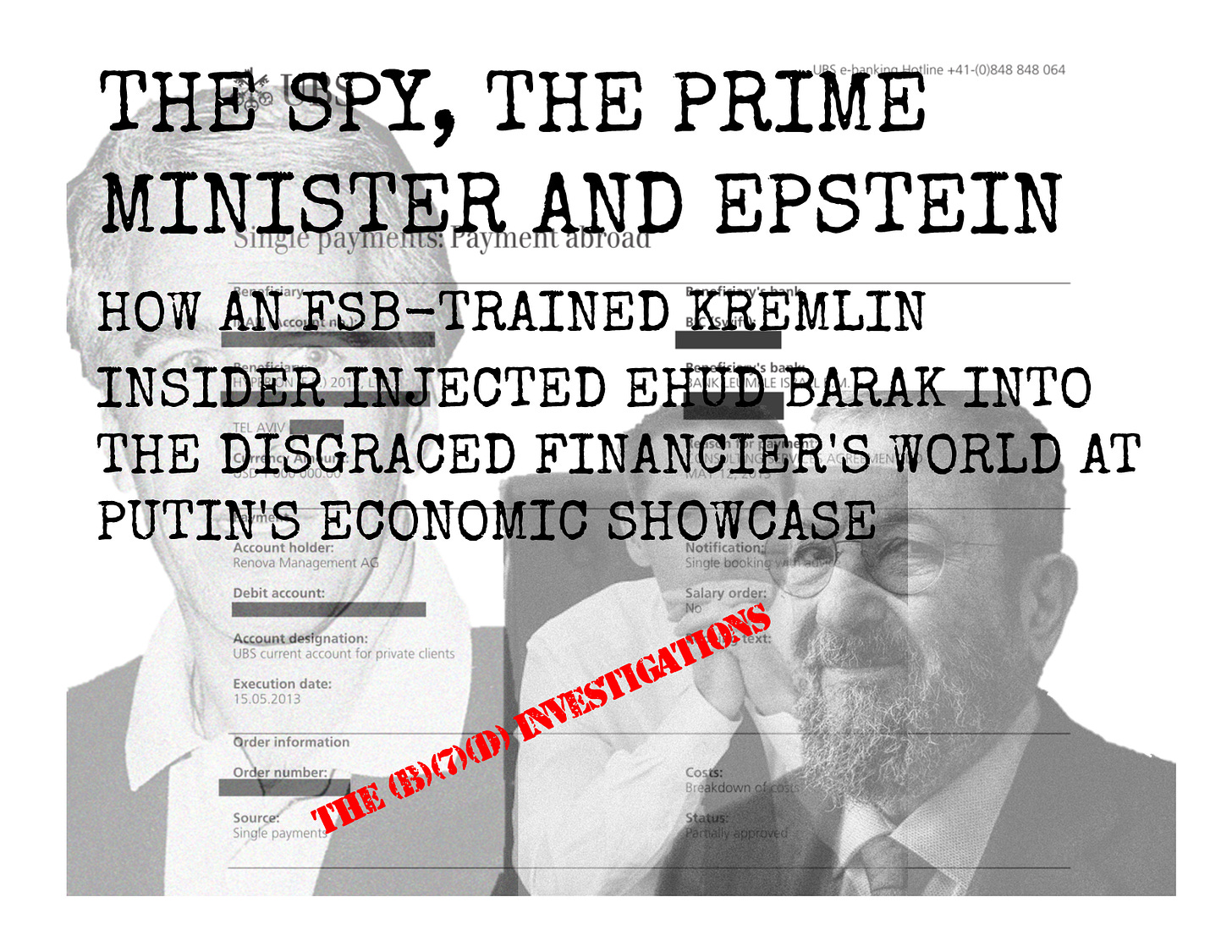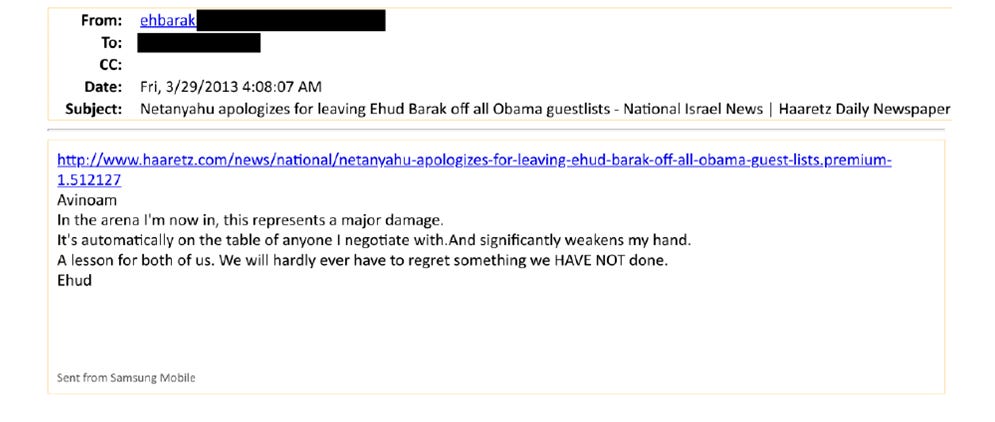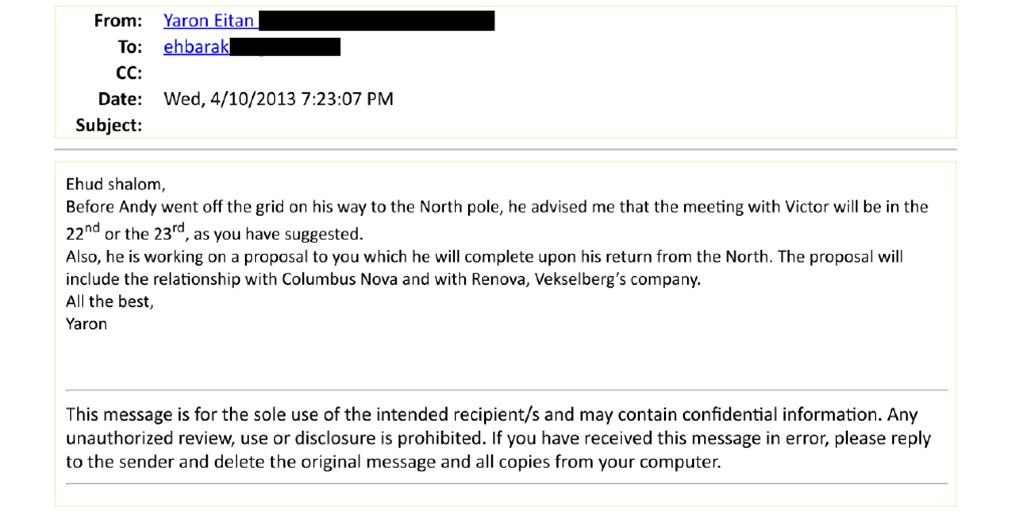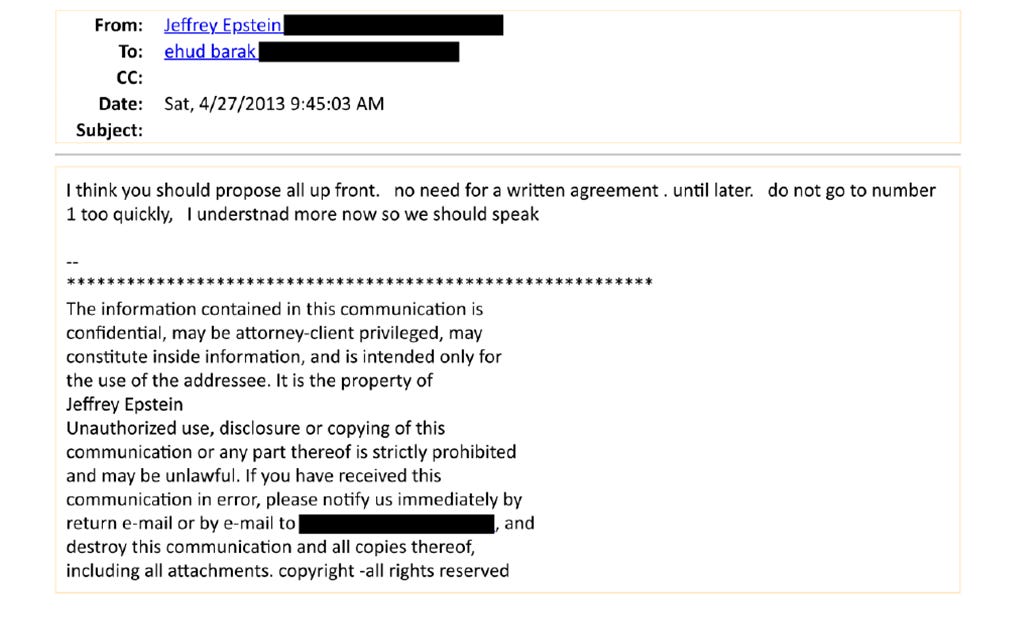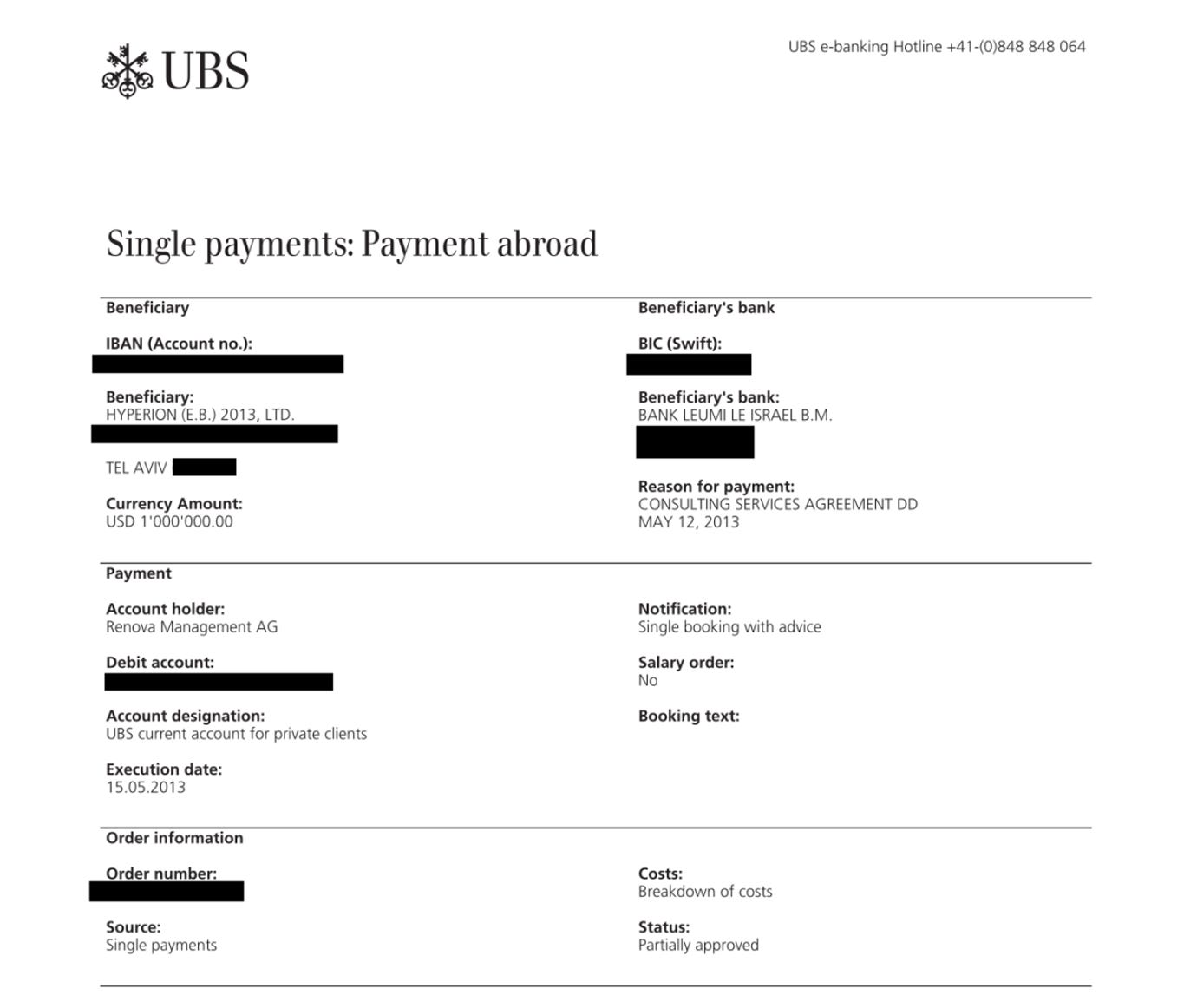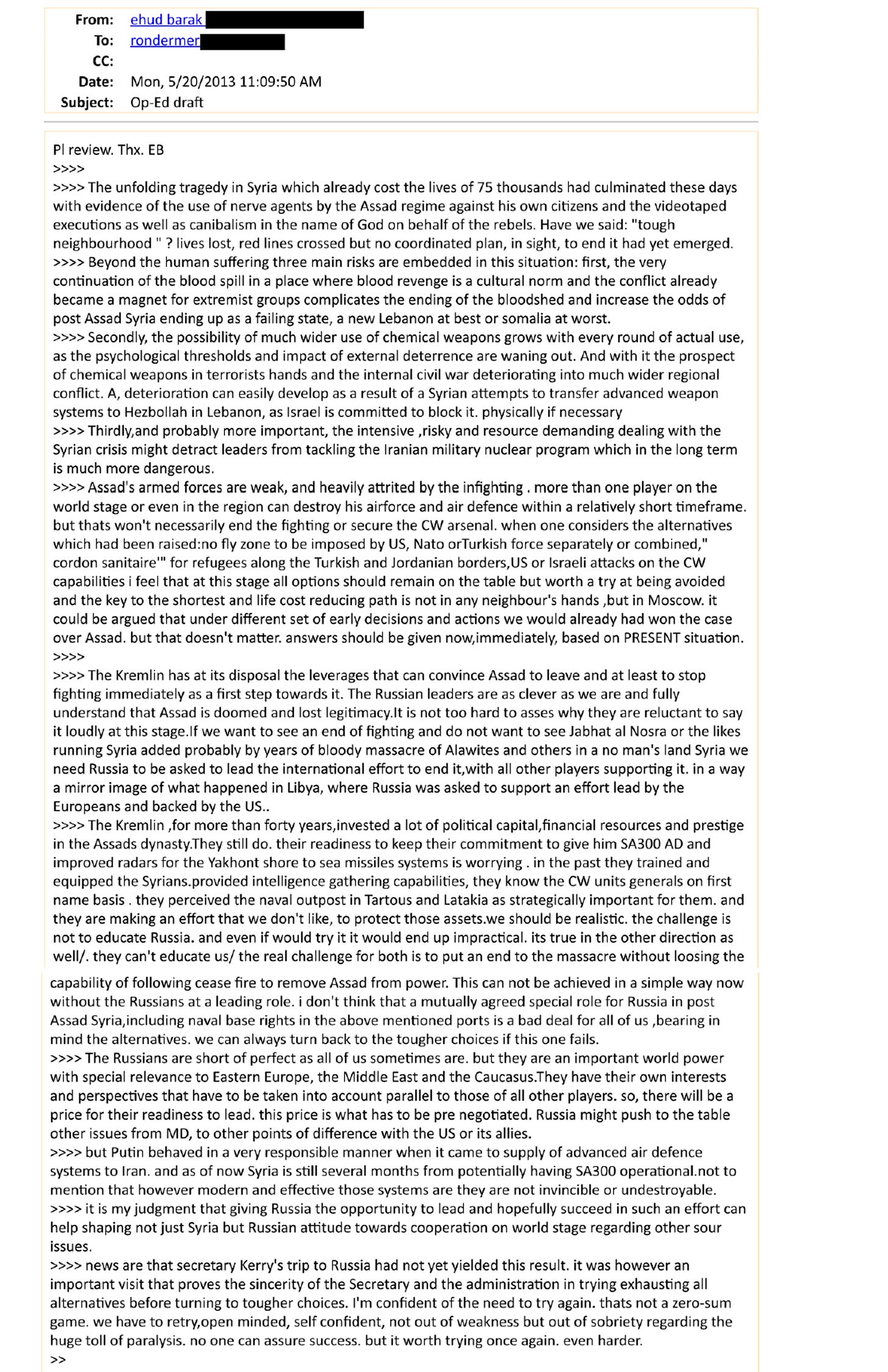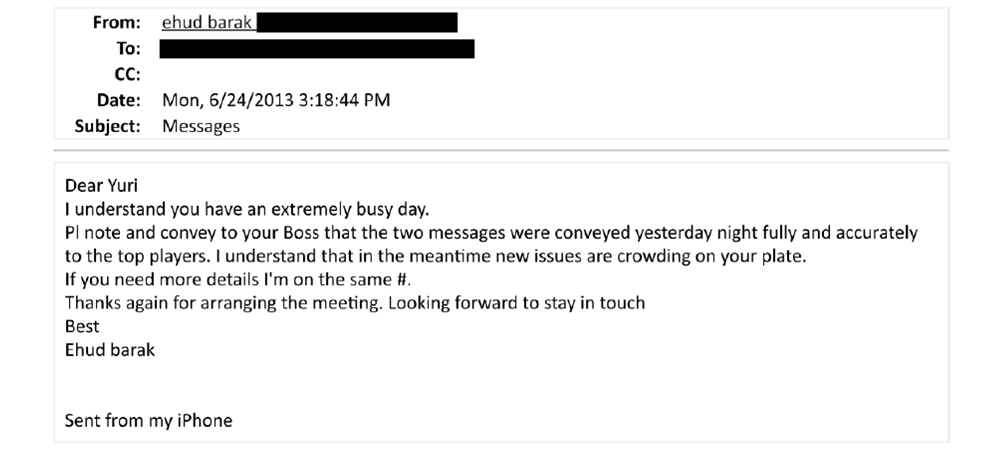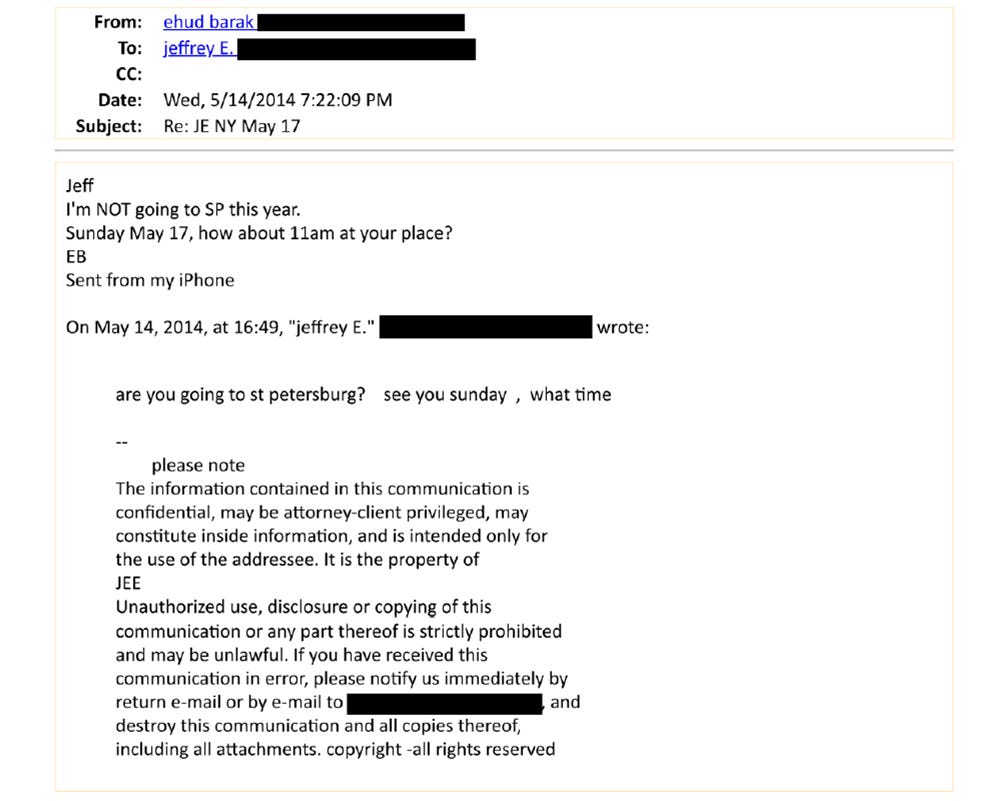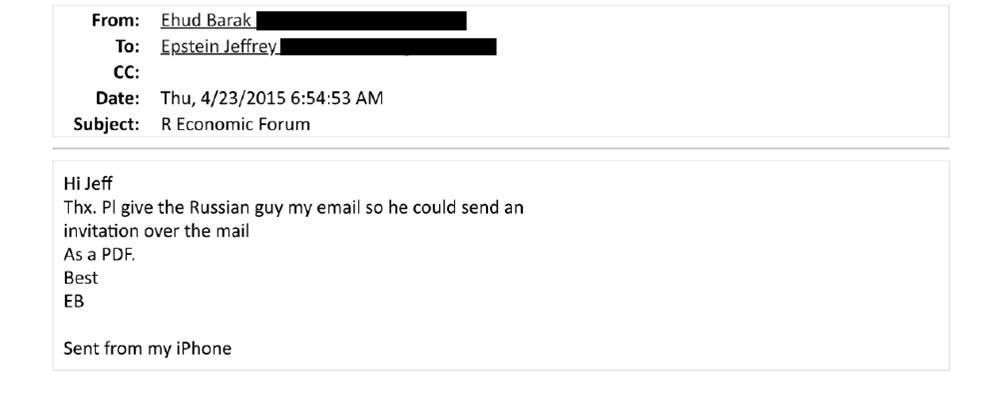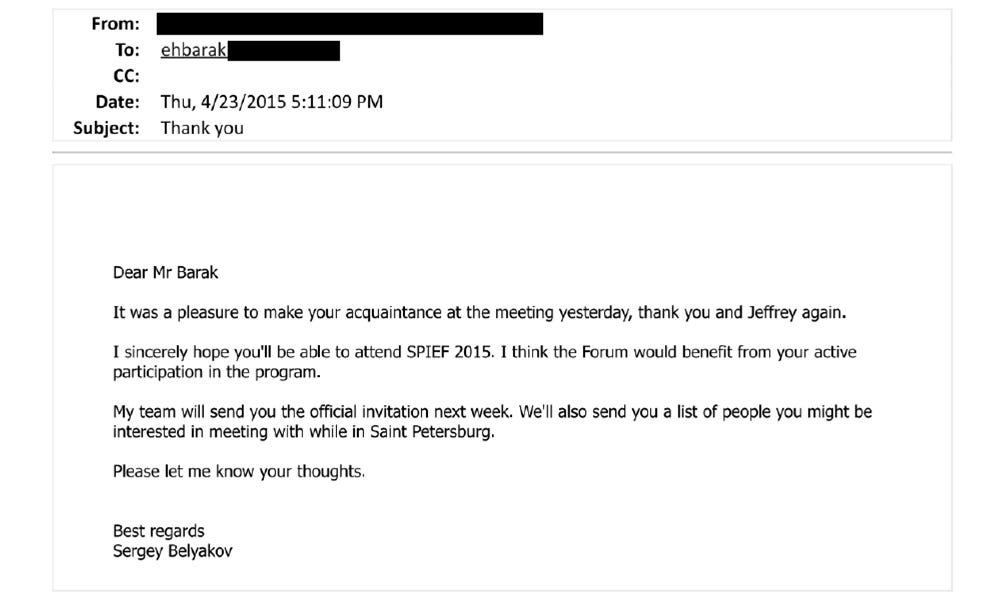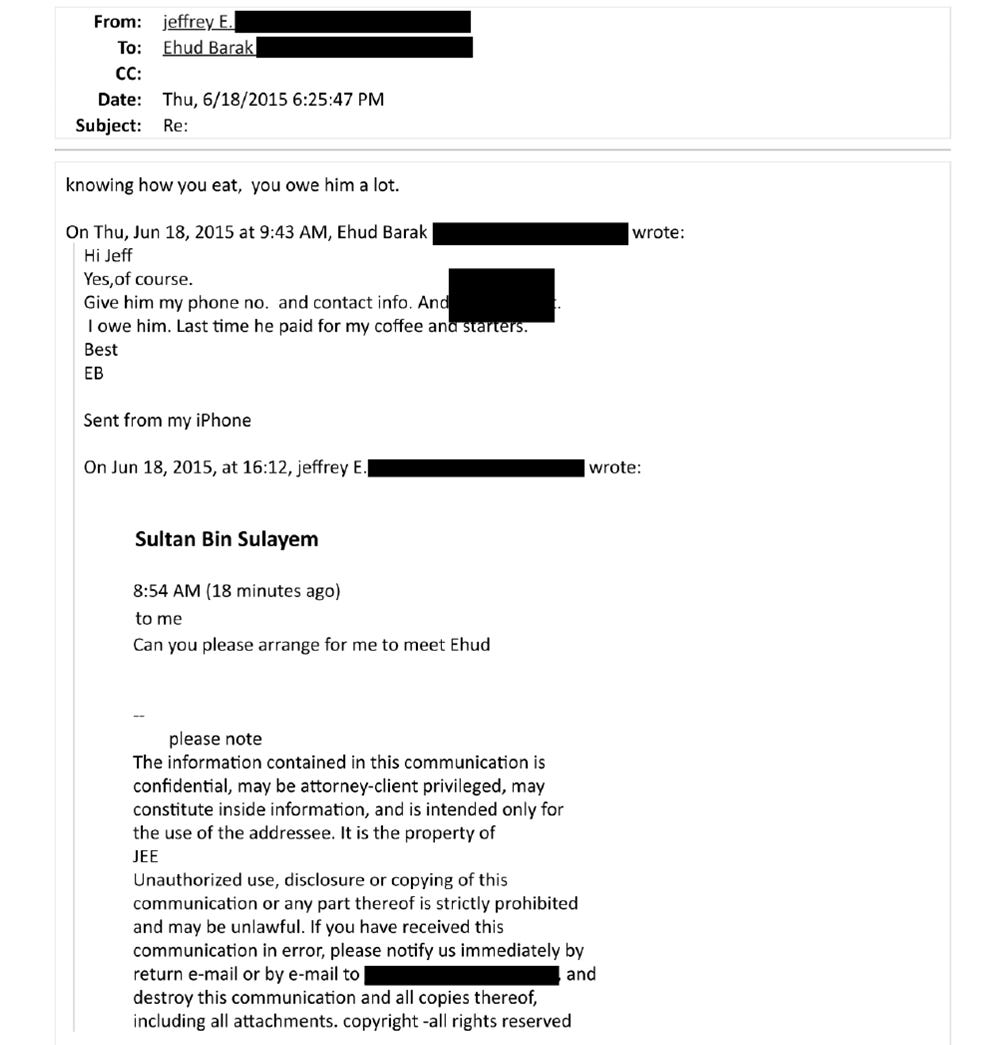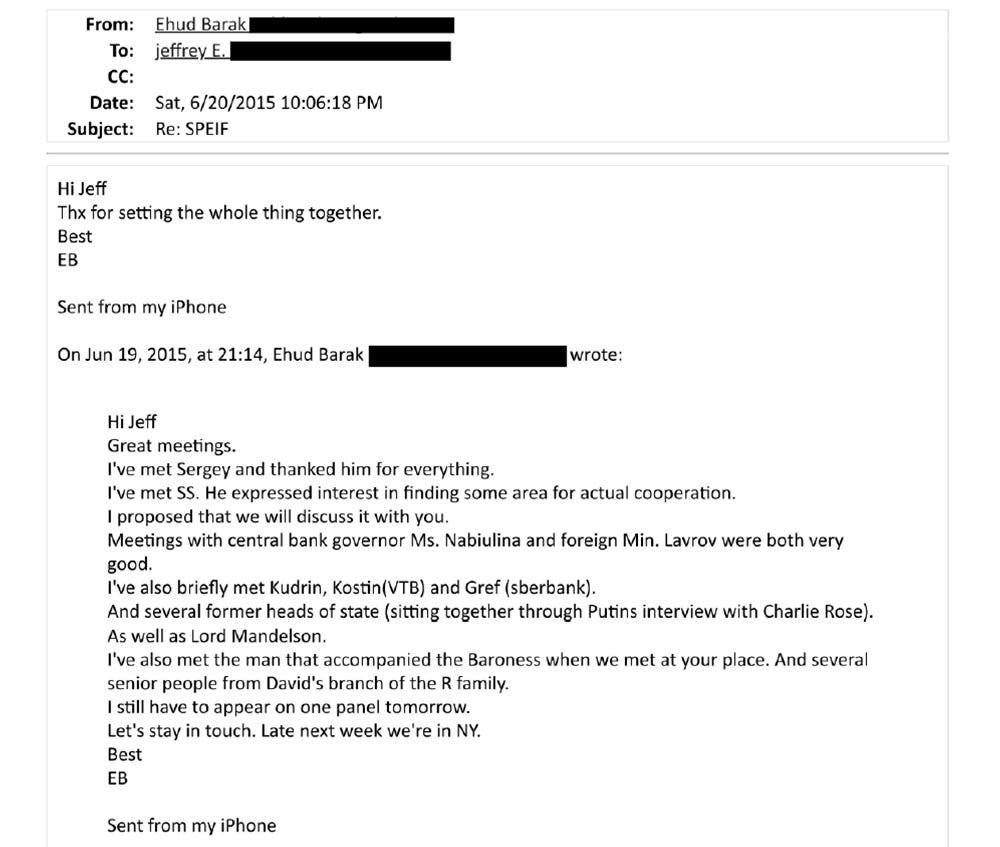THE SPY, THE PRIME MINISTER AND EPSTEIN
HOW AN FSB-TRAINED KREMLIN INSIDER INJECTED EHUD BARAK INTO THE DISGRACED FINANCIER'S WORLD AT PUTIN'S ECONOMIC SHOWCASE
By Rob Waldeck
After leaving the post of Defense Minister in early 2013, former Israeli Prime Minister Ehud Barak sought to connect with Russian interests in order to resume his business career. Advised by his friend, disgraced U.S. financier Jeffrey Epstein, Barak signed a $1 million consulting contract with Kremlin‑allied oligarch Viktor Vekselberg. Using Epstein’s advice and connections, in 2015 Epstein connected the Israeli politician to key Russian figures at Putin’s St. Petersburg International Economic Forum, emails obtained by The (b)(7)(D) show. Epstein’s relationship with FSB‑trained SPIEF head Sergey Belyakov helped Barak secure private meetings with senior figures in the Russian government and earned the former Israeli PM speaking spots at the conference. While there, Epstein also reconnected Barak with a key Gulf figure, Sultan bin Sulayem, right‑hand to UAE billionaire Sheikh Maktoum, Ruler of Dubai.
The connections Epstein provided were critical to Barak’s burgeoning consulting career, which relied on insights gained from continued access to world leaders. The new emails both deepen and reveal some of the mysteries surrounding Epstein’s ongoing financial and political ties. They may also help explain the types of information regarding Epstein that the Trump administration is seeking to keep from public view.
COMMANDER OF THE PILLAR OF FIRE
Ehud Barak, like many Israeli politicians, began his service to the state in the Israeli Defense Forces. In 1974, he led a dramatic commando raid on a hijacked jet parked at Tel Aviv’s airport that freed 89 of the 90 hostages.
Barak rose steadily through the ranks, commanding elite units such as the 611th “Pillar of Fire” armored brigade, before becoming Chief of Staff of the IDF from 1991 to 1995. After leaving the military, Prime Minister Yitzhak Rabin appointed him Minister of the Interior. Later in 1995, Barak became Foreign Minister, and in 1996 he won a seat in the Knesset as a member of the Labor Party.
In 1997, he became leader of the Labor Party, and in 1999 he defeated then‑Prime Minister Netanyahu to become Prime Minister. Ariel Sharon defeated Barak in the 2001 election, after which Barak resigned from the Knesset.
Barak returned to politics in 2007 as Minister of Defense and continued to serve in that role as a coalition partner after Netanyahu’s 2009 election victory.
THE ENVELOPE AT THE KEMPINSKI FRONT DESK FOR MR. BONDOVSKY IN ROOM 644
Barak told the Daily Beast that he was first introduced to Epstein by former Israeli Prime Minister Shimon Peres in 2002. In late summer 2012, emails obtained by The (b)(7)(D) show that Barak and his wife Nili were already arranging meetings with Jeffrey Epstein in New York.
Barak announced his retirement from politics in late 2012. His last day as Minister of Defense was March 19, 2013. That same day, emails show, Barak’s brother‑in‑law and close advisor Doron Cohen sent an email to Yoan Eitan, whom SEC filings list as a director of Columbus Nova, a company described by Forbes as a “family office, owned by Americans” for now‑sanctioned Russian billionaire Viktor Vekselberg, whom the U.S. government describes as having “close ties” with Russian government officials, including Russian President Vladimir Putin.
Cohen’s email was cc’d and forwarded to the personal account of newly minted private citizen Ehud Barak. According to documents obtained by The (b)(7)(D), Barak incorporated Hyperion, Ltd. in Israel the next day as a vehicle for international consulting.
Netanyahu was not going to make it easy for his former political opponent to enter private life. Twenty‑four hours after Barak left the Defense Ministry, U.S. President Barack Obama arrived for a state visit to Israel. Netanyahu left Barak off all guest lists for events with Obama. Although Netanyahu called to apologize that Saturday, Haaretz published an article highlighting the snub.
Barak emailed his brother, Avinoam Brog, underscoring the danger for a former statesman trying to secure lucrative consulting contracts. “In the arena I’m now in, this represents a major damage. It’s automatically on the table of anyone I negotiate with. And significantly weakens my hand.” Barak followed up the email with a request that Avinoam, a media executive, try to keep the story out of the hands of satirist Muli Segev to limit the damage. Continued access to world leaders was critical to the next stage of Barak’s career.
Eitan then agreed to meet with Barak and Columbus Nova CEO Andy Intrater in New York on April 5, so that the newly private citizen could “have a chance to see Columbus Nova and learn more about their activities.” Emails show that after a successful meeting, Intrater suggested Barak meet face‑to‑face with Vekselberg in New York in late April to discuss a potential relationship between Barak, Columbus Nova, and Renova Group, Vekselberg’s vast Russian holding company. On April 26, emails indicate, Barak met with Vekselberg in New York.
After the meeting, Epstein emailed Barak to ask how it had gone. Barak replied that the meeting was “good to very good,” but that the deal had not yet been completed. Epstein wrote back advising Barak to request the funds for the deal up front.
Barak arranged to fly to Moscow to meet Vekselberg and complete the deal. Epstein emailed Barak, advising his friend to “read all you can” about Vekselberg’s companies so that the Russian billionaire would understand Barak was proactive. Barak emailed Epstein, asking him, “pl don’t share the info with any of our friends.” Epstein replied that he would not and suggested that Barak “let Putin know you will be in Moscow. See if he wants private time.”
Travel records obtained by The (b)(7)(D) show Barak arrived on May 12 and checked into Moscow’s Kempinski Hotel under the alias “Mr. Bondovsky.”
The next day, Barak met with Vekselberg and executed the consulting agreement. A Renova employee later emailed Barak, informing him that the signed agreement was at the front desk of the Kempinski Hotel, with Barak’s Room 644 noted on the envelope.
THE KREMLIN HOLDS THE KEYS
Documents obtained by The (b)(7)(D) show that on May 15, the Renova Group wired $1 million to Hyperion, Ltd.’s bank account in Israel. In the early hours of May 17, Barak emailed his former spokesperson a draft op‑ed about the Syrian Civil War, writing that “we need Russia to be asked to lead the international effort to end it.” Barak also emailed Epstein to solicit his input on the piece.
Barak also sought input on the op‑ed from Prime Minister Netanyahu’s senior foreign policy aide, Ron Dermer. Dermer made corrections, which Barak passed along to his aide, who then forwarded the piece to a New York Times opinion editor under the title “The Kremlin Holds the Keys.” The Times rejected the submission, explaining that the “mechanics” for a deal were not “spelled out.”
Emails show that the Wall Street Journal and the Washington Post also passed on Barak’s opinion piece, which ultimately appeared in the Daily Telegraph on May 30 under the title “The price will be high, but the key to Syria’s civil war lies in Vladimir Putin’s Moscow.”
By this time, Barak had reached out to top Kremlin aide Yuri Ushakov, requesting a face‑to‑face meeting with Putin. On June 11, Ushakov emailed Barak confirming that Putin would meet him on June 20, the opening day of the St. Petersburg International Economic Forum. The next morning, a SPIEF staffer emailed Barak’s wife, Nili, with a formal invitation for Barak to attend the forum.
Epstein appeared well‑informed about coming moves in the Kremlin, emailing Barak that Putin “will re do his staff in summer, bringing only trusted people closer,” adding, “more info on phone or face to face.” Days later, at the conference, Putin announced a staff reshuffle.
After Barak arrived in Russia, Epstein helped him connect with other foreign attendees, emailing the former Israeli PM that “my friend” Sultan bin Sulayem was in St. Petersburg. Epstein described the Sultan as the “right hand man of [Sheikh Mohammed bin Rashid al] Maktoum.” Maktoum—Ruler of Dubai, Prime Minister of the United Arab Emirates, and owner of Dubai World—has an estimated net worth of at least $18 billion. Barak was able to meet with bin Sulayem.
After the Putin meeting, Barak emailed Ushakov to thank him for arranging it and told the Kremlin adviser that two messages Putin had given him were “conveyed yesterday night fully and accurately to the top players.”
In early 2014, after pro‑Russian Ukrainian President Viktor Yanukovych fled Kyiv for Russia, Russian President Vladimir Putin ordered the invasion of eastern Ukraine and the occupation of Crimea. The United States responded in March 2014 by imposing broad sanctions on Russia, and U.S. allies soon followed with sanctions of their own. In May 2014, Barak emailed Epstein to inform him that he would not be attending SPIEF that year.
The result of Western sanctions was an economic crisis in Russia. The ruble collapsed, and a worldwide oil glut deepened the country’s economic pain. By 2015, Russia was seeking a way out of its isolation from the global economy. Among those it turned to was Jeffrey Epstein.
Since the 2013 SPIEF, a new man had been placed in charge of the forum: former Deputy Economic Development Minister Sergey Belyakov. Belyakov graduated in 1998 from the FSB Academy, the successor to the KGB Higher School that trains intelligence officers. After two years in the Border Guards, he experienced a near‑meteoric rise through economic and business posts in the Russian Federation. In August 2012, Belyakov was appointed Deputy Economic Development Minister.
In 2014, as Russia faced economic crisis, it resorted to using pension fund contributions to cover shortfalls in the state budget. The government promised the contributions would return to being invested in the broader economy to grow the pension fund the following year. But in early August 2014, the Russian government announced it would again divert pension contributions to cover budget shortfalls.
Belyakov spoke out against the move on Facebook, calling the decision “stupid” and saying, “I ask everyone’s forgiveness for the follies we commit and for not keeping our word.” He was soon fired. Later in 2014, Belyakov resurfaced as head of the foundation that runs SPIEF. He was not only a graduate of the FSB Academy and a former Deputy Economy Minister—he was also Jeffrey Epstein’s friend.
As first reported by the Dossier Center, on April 22, 2015, in New York, Epstein introduced Barak to Belyakov. Emails obtained by The (b)(7)(D) show that at the meeting, Belyakov, Epstein, and Barak discussed Barak’s attendance at the 2015 SPIEF. After leaving the meeting, Barak emailed Epstein, asking that he please “give the Russian guy my email so he could send an invitation over the mail. As a PDF.”
Epstein then emailed Barak, telling him that he “spoke to sergey afterwards. he will help,” adding that he wanted Barak to send a note saying that Putin should meet with Epstein.
Belyakov then emailed Barak, saying that he hoped Barak could attend SPIEF 2015 and that an official invitation would be coming the following week. Belyakov added, “We’ll also send you a list of people you might be interested in meeting while in Saint Petersburg.”
The next week, Belyakov emailed Barak a formal invitation and provided a list of people Barak might want to meet, including Sergey Ivanov, Head of the Presidential Administration; Sergey Lavrov, Russia’s Foreign Minister; and Elvira Nabiullina, head of the Russian Central Bank. Barak replied that he was planning to attend and wanted to meet all three Russian leaders.
Belyakov also invited Barak to participate in panel discussions at the Forum. Eventually, Barak agreed to sit on two panels: Unlocking the Potential Growth of the Knowledge Economy and Building Effective Cyber Security Systems. A month before the conference, Barak emailed Epstein, telling him that “Sergei helps a lot.”
Barak also sought another meeting with Putin, emailing top Kremlin aide Ushakov. This time, emails show, Ushakov told Barak that the Russian President’s schedule was full. Despite this, Barak’s meetings with other top Russian figures went ahead.
Epstein worked hard to connect Barak with billionaires attending SPIEF, emails show, including Baroness Ariane de Rothschild and Sultan bin Sulayem. Although Rothschild skipped the conference, Epstein arranged a second meeting between Sulayem and Barak. When Barak emailed Epstein that he owed the Sultan for “coffee and starters” from their last meeting, Epstein joked, “knowing how you eat, you owe him a lot.”
GLAD YOU FOUND IT USEFUL
Barak was highly pleased with his 2015 SPIEF experience, emailing Epstein, “Great meetings. I’ve met Sergey and thanked him for everything,” adding that he had also met Sulayem, who “expressed interested in finding some area for actual cooperation.” Barak noted that his meetings with Nabiullina and Foreign Minister Lavrov “were both very good.”
The next day, Barak emailed, “thx for setting the whole thing together.” Epstein replied two minutes later that he was “glad you found it useful.”


